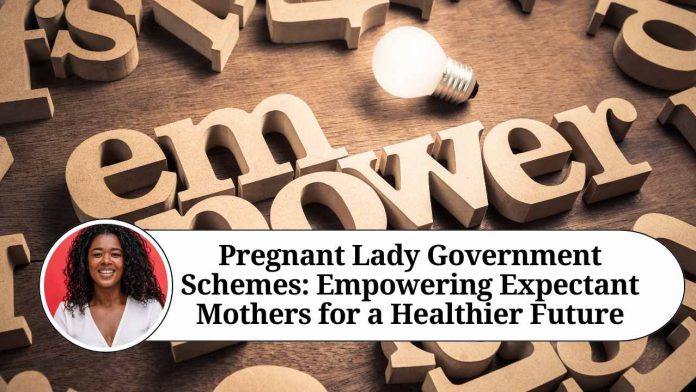Introduction:
Pregnancy is a momentous and life-transforming experience for women. It is a time when their physical and emotional well-being becomes paramount. Recognizing the significance of supporting pregnant women during this phase, governments around the world have implemented various schemes and programs aimed at providing comprehensive care and assistance. In this blog, we will explore some of the government schemes available for pregnant women, highlighting their benefits and how they contribute to a healthier future for both mothers and their unborn children.
Maternity Benefits:
One of the most common government schemes for pregnant women is the provision of maternity benefits. These benefits are designed to provide financial assistance to expectant mothers, ensuring that they can afford quality healthcare, proper nutrition, and a stress-free environment during pregnancy. Maternity benefits often include paid maternity leave, which allows women to take time off work to rest and prepare for childbirth. This support promotes the well-being of both the mother and the child.
Prenatal Care and Health Services:
Access to adequate prenatal care and health services is crucial for the well-being of both the pregnant woman and her unborn child. Governments have recognized this and implemented various schemes to ensure that expectant mothers receive the necessary medical attention. These schemes may include free or subsidized prenatal check-ups, vaccinations, ultrasound scans, and laboratory tests. Additionally, governments may provide counseling services to address emotional and mental health needs during pregnancy.
Nutritional Support:
Proper nutrition plays a vital role in a healthy pregnancy and the development of the fetus. Many government schemes aim to address nutritional deficiencies among pregnant women by providing food supplements, such as iron and folic acid tablets, to support the growth and development of the unborn child. These programs may also include access to nutritious meals and education on balanced diets to ensure that pregnant women receive adequate nourishment.
Financial Assistance for Delivery:
Childbirth can be an expensive affair, especially for families with limited financial resources. Government schemes often provide financial assistance to pregnant women to cover the costs associated with childbirth. This assistance may include coverage for delivery expenses, hospitalization costs, and even support for cesarean section procedures, if required. By alleviating the financial burden, these schemes ensure that expectant mothers can focus on their well-being and that of their babies without worrying about the economic implications.
Maternal and Child Health Awareness Programs:
Education and awareness about maternal and child health are essential for promoting healthier outcomes. Governments implement awareness programs to educate pregnant women and their families about proper prenatal care, the importance of immunizations, breastfeeding, and postnatal care. These programs often include workshops, seminars, and information campaigns that empower women with knowledge to make informed decisions regarding their health and the well-being of their children.
Conclusion:
Government schemes for pregnant women are instrumental in promoting the overall well-being of expectant mothers and their unborn children. By providing financial, medical, and educational support, these schemes contribute to healthier pregnancies, safer childbirths, and improved outcomes for both mothers and babies. It is important for pregnant women and their families to stay informed about the available government schemes in their respective regions to make the most of the support and resources provided. Governments should continue to prioritize and expand such initiatives to ensure that every pregnant woman receives the care and assistance she deserves, regardless of her socio-economic background. Together, we can create a healthier and brighter future for expectant mothers and their little ones.
Read more useful content:
Frequently Asked Questions (FAQs)
Q1: What government schemes are available for pregnant women?
A1: There are various government schemes available for pregnant women, including maternity benefits, prenatal care and health services, nutritional support, financial assistance for delivery, and maternal and child health awareness programs.
Q2: How can I avail maternity benefits?
A2: To avail maternity benefits, you need to check with your employer or local government office regarding the specific requirements and procedures. Generally, you will need to provide necessary documentation, such as proof of pregnancy and medical certificates, to initiate the process.
Q3: Do government schemes cover prenatal check-ups and tests?
A3: Yes, many government schemes provide free or subsidized prenatal check-ups, vaccinations, ultrasound scans, and laboratory tests to ensure proper prenatal care for pregnant women.
Q4: Can pregnant women receive financial assistance for childbirth expenses?
A4: Yes, government schemes often provide financial assistance to cover childbirth expenses, including hospitalization costs, delivery expenses, and even support for cesarean section procedures, if required.
Q5: Are there any schemes to address nutritional needs during pregnancy?
A5: Absolutely. Many government schemes offer nutritional support to pregnant women. This may include providing food supplements, such as iron and folic acid tablets, and access to nutritious meals.
Q6: Are there programs to raise awareness about maternal and child health?
A6: Yes, governments often implement awareness programs to educate pregnant women and their families about prenatal care, immunizations, breastfeeding, and postnatal care. These programs aim to empower women with knowledge to make informed decisions.
Q7: Are these schemes available to all pregnant women, regardless of their socio-economic background?
A7: Government schemes aim to support all pregnant women, especially those from economically disadvantaged backgrounds. However, the specific eligibility criteria and benefits may vary depending on the region and scheme.
Q8: How long is the maternity leave provided under these schemes?
A8: The duration of maternity leave varies across countries and schemes. Some countries offer several weeks or months of paid maternity leave, while others may provide a combination of paid and unpaid leave. It’s essential to refer to the local labor laws or consult with your employer for accurate information.
Q9: Can I access counseling services during pregnancy?
A9: Yes, some government schemes offer counseling services to address emotional and mental health needs during pregnancy. These services can provide support and guidance to pregnant women throughout their journey.
Q10: Where can I find information about government schemes for pregnant women in my region?
A10: You can find information about government schemes for pregnant women through local government offices, healthcare facilities, women’s health centers, or official government websites. It is advisable to reach out to these resources to obtain accurate and up-to-date information relevant to your specific region.




















